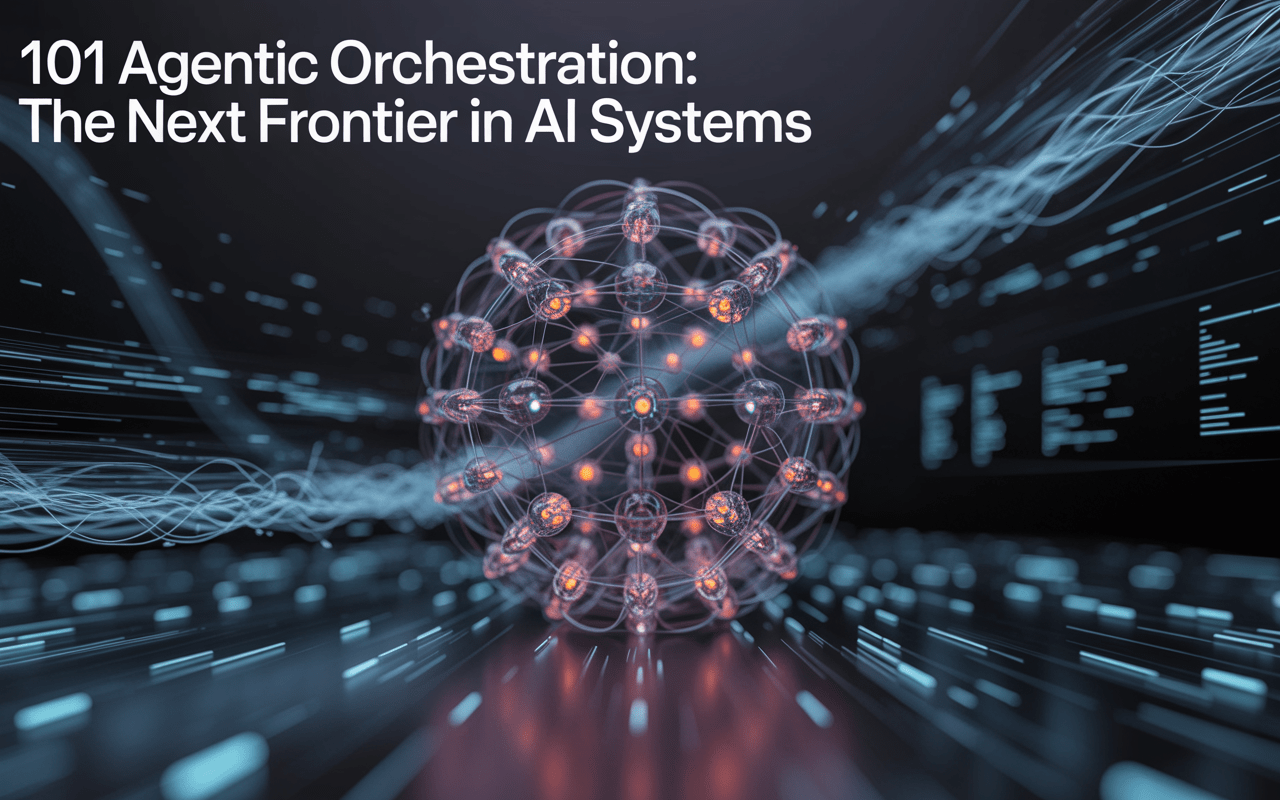
Why the future of AI depends on orchestrating teams of intelligent agents—working together like an orchestra rather than relying on a single model.
Artificial Intelligence has rapidly advanced before our eyes—first from rule-based systems that followed simple instructions, then to machine learning models that learned from data, and now to powerful large language models (LLMs) and generative AI platforms that can converse, create, and problem-solve at a human-like level.
I’ve seen this evolution not only as a technical milestone, but as a change in how we think about intelligence itself. For years, the focus was on building one model to do everything: the smarter the model, the more we expected it to solve on its own. But as organizations actually put AI into practice, especially in complex, multi-step processes like research, planning, customer interaction, or decision-making, a different reality has set in. No single model, no matter how advanced, can handle every nuance, every decision point, and every specialized skill that real-world tasks demand.
This is where a new paradigm is emerging—one I believe will define the next decade of AI: Agentic Orchestration.
To me, this concept is both intuitive and revolutionary. It’s no longer about having one “super-AI” doing everything; it’s about coordinating multiple AI agents, each designed with a particular strength—retrieving knowledge, reasoning through logic, generating creative outputs, monitoring compliance—into a cohesive system that behaves more like a team than a tool.
Think of it like conducting an orchestra: the violin doesn’t compete with the trumpet, and the piano doesn’t try to play the drums. Each instrument plays its role, but without a conductor, the result would be noise. Agentic orchestration is that conductor—directing, harmonizing, and balancing different AI agents so they operate autonomously when needed, adaptively when challenged, and responsibly when the stakes are high.
For me, this shift feels personal because it changes the way I imagine working with AI. Instead of asking, “What can this single model do for me?” I now ask, “How can these agents work together for me?” It’s not about replacing human intelligence—it’s about surrounding ourselves with a team of digital collaborators that can handle the routine, augment the complex, and free us to focus on vision, creativity, and leadership.
What Is Agentic Orchestration?
At its core, agentic orchestration refers to the structured management of multiple AI agents—specialized modules that can perceive, decide, and act—working together toward a larger goal. Much like an orchestra, where each instrument contributes to the overall symphony, these AI agents must be directed and synchronized to avoid conflict, redundancy, or failure.
Unlike traditional automation pipelines, which follow rigid, predefined rules, agentic orchestration allows for:
-
Dynamic task allocation: Different agents can take on responsibilities in real time, depending on context and need.
-
Collaborative reasoning: Agents can exchange information, critique each other’s outputs, and converge on better solutions.
-
Resilience and adaptability: If one agent fails or produces low-quality results, others can intervene to correct or replace its output.
Why It Matters
As organizations adopt AI for knowledge work, customer service, logistics, software development, and even governance, single-model approaches are proving insufficient. Complex problems require the interplay of multiple capabilities: reasoning, planning, memory, retrieval, execution, and evaluation.
Agentic orchestration enables:
-
Scalability – Enterprises can expand AI deployments without overwhelming a single model.
-
Efficiency – Specialized agents reduce computational waste by focusing only on what they are optimized for.
-
Trust and oversight – Orchestration frameworks can enforce guardrails, monitor decisions, and ensure compliance with ethical or regulatory standards.
Examples in Practice
-
Customer Experience: A virtual agent for product support may be orchestrated with a retrieval agent (knowledge base lookup), a reasoning agent (diagnosis), and a transaction agent (order processing AI Platforms: Projects like 101AIAgent.com are already pioneering this approach—showcasing how multiple agents can be orchestrated into ecosystems that work together to deliver outcomes no single model could achieve alone.
-
Healthcare: Diagnostic agents, scheduling agents, and treatment-recommendation agents can collaborate under an orchestration layer to support doctors.
-
Enterprise Workflows: In business process automation, orchestration ensures legal, financial, and compliance agents interact without contradictions.
-
Software Development: Multiple agents—code generators, testers, and reviewers—can collectively deliver reliable software at speed.
Challenges Ahead
While the promise of agentic orchestration is profound, it also raises important challenges:
-
Coordination Complexity – Designing communication protocols among agents is non-trivial.
-
Error Propagation – Mistakes from one agent can cascade if not caught by others.
-
Transparency – Orchestrated systems must remain interpretable to human supervisors.
-
Governance – Balancing autonomy with human oversight is critical for responsible use.
The Road Forward
Agentic orchestration represents the next evolutionary step in AI adoption. As enterprises shift from isolated tools to agent ecosystems, orchestration frameworks will become as important as the agents themselves. Just as operating systems enabled the personal computing revolution, agentic orchestration could be the foundational layer for the AI-powered economy.
The future of AI will not be about a single model doing everything—it will be about many agents working together, intelligently orchestrated, and aligned with human goals.
This article is published by AI World Journal © 2025. All rights reserved.
You might enjoy listening to AI World Deep Dive Podcast:
#Agentic #Orchestration #Frontier #Systems
